There is a large flock of feral chickens on the property. When the real estate agent gave us the first tour, by video, we could hear roosters crowing in the distance.
What time is it there? I asked.
Noon, replied Mário. Behind him a rooster strutted past, his red comb and teal tail feathers the brightest thing in the frame.
Sounds like they are mixed up about when morning is, I said. To which Mario said nothing, perhaps fearing we’d be put off by the fact he knew well as the agent of the property that roosters don’t just crow at dawn but all day and sometimes all night long.
Now, we know from experience: roosters are only quiet in the evening - from 7p to midnight as they start to roost - but will crow at danger, or just for the heck of it, all day long as well as in the dead of night. At 4:45 sharp the alpha will begin proclaiming his wonderfulness to the world, and the other roosters, believing they are equally wonderful, will respond and will not stop until feeding time at 7a. Since there are at least 15 roosters it is quite a cacophony.
Fifteen roosters is a lot of roosters; occasionally someone will stop by and ask to buy one, but I have not been able to bring myself to sell any. They are a big extended family and live in harmony, and until I know them better, and can identify with confidence any troublemakers, I’m reluctant to break up the flock. I guess I admire them too much to introduce any more trauma in their lives than they already deal with.
Where did they come from? we ask Mario, and he shrugs and opines that maybe a few escaped from a neighbor’s flock. Our village of Belas is a farming community so this is a reasonable though incorrect assumption. It was especially funny coming from Mario who apparently did not know the property very thoroughly; once the purchase was complete, the h came to me with a set of plans the previous owner, a developer, had ordered up.
There is a building up there behind the pool house, he reported. We went to see, picking our way through seedling trees and mounds of broken tile and grass and household detritus. A few steps were visible leading up and away from the pool house courtyard, but a thicket of brambles and sprawling branches from a massive fig tree stopped us from moving or seeing further. I forgot about it, but the h went to work with a chainsaw and after a few days of constant battle (and a few nights of conking out by 10p after hoisting a chainsaw above his head for hours on end) he invited me to see what he had uncovered: a three room chicken coop made of stone, with a proper tile roof - large enough to house a person or two comfortably, it features a courtyard for chickens to scratch around in that is at least 20’ x 20’.
So the feral chickens are actually descendants of chickens who lived on the property thirty years ago. Our neighbor Alberto confirms this and informs us the previous owners also kept rabbits and pygmy goats, and ever since this conversation I have had a pygmy goat gleam in my eye the h pretends not to see.
It took two days of work by the gardener Tiago to clean away the roots and seedling fig trees and render the chicken courtyard clear; next we’ll build roosts and nesting boxes before luring the flock to their new home.
There is a sense of urgency, as we now have five hens with chicks - at last count a total of 39 babies, though that number is sure to be depleted by predators before we can get them all to safety.
The predators are many - mostly stray cats, but also birds of prey and rats. We have trapped two rats already; the cats have made themselves scarce since the appearance of Jake, who has zero interest in chasing them but they don’t know that. As a result of eliminating the rats and Jake’s presence, the number of chicks has held steady. They range in age from a week to five weeks.
People talk admiringly of mama bears but hens are just as fierce in their way. They are cautious, and do not begin to trust me for a month or so after which they still remain cautious but accept me on a trial basis.
The newest mama still keeps her distance, but has taken to leading her chicks from the eastern field to the driveway, waiting there for each feeding. She has obviously instructed her chicks to keep behind her, and she watches me with one eye, one foot off the ground and ready to hustle the brood away from me should I move too quick or make too much noise.
The two mamas that live in the copse of trees between the main house and the road are more comfortable with me; the one with the older chicks - a batch of eleven that has remained miraculously intact thanks to mama - will come out to the front courtyard to greet me and follow me to the clearing in a peremptory way, as if saying to her chicks Hurry up now! She knows the free for all that is the morning feeding is about to begin.
She will peck up some food and the chicks will imitate her, while she chases off the young roosters and hens that crowd my feet. Sometimes she’ll grab the tail feathers of a particularly greedy rooster in her beak, holding on an extra few seconds and giving them a yank as if to say, I can take you down any day, buster, and don’t you forget it!
The older more experienced hen recognizes me as a dependable food source and is now the first to appear at feeding time; we are like two ladies who see each other at the park each morning, our comfortable familiarity almost the same as friendship.
For awhile the younger mama was still shy of me and would lead her bumbling babies just to the edge of the clearing where the feeding takes place. I always place a jar of food for baby chicks there, and keep a respectful distance after tossing her some feed. The chicks have just begun to understand that they can go into the jar and eat safely away from the pecking beaks and trampling feet of the rest of the flock. For awhile they toddled around the jar pecking at the glass, not understanding why they couldn’t eat what they could see so clearly. They scratch their little feet on the ground in imitation of mama and peck the jar, sometimes falling over. When one bumbles into the jar the rest quickly follow, til it’s almost too crowded for them to eat. I keep a close eye on the jars; as the chicks grow they sometimes get stuck and begin cheeping in that high pitched way they have when alarmed. Then I’ll pick up the jar and overturn it, booping it on the bottom and the chick will drop out like the last errant peanut coming unstuck.
Then one day this mama decides I am safe; I knew I’d won her over when, arriving at the clearing (which I have nicknamed Chicken Flats) for the afternoon feeding, I found her not skulking in the brush but sitting serenely in the center of the clearing, her feathers bunched to indicate the nine babies beneath her.
Two young hens decided the dried up koi pond was a good place to lay eggs, something I was unaware of until the husband pointed them out, huddled together at the far edge. Their chicks hatched within days of each other and now the pond is full of little puffballs. Each morning and afternoon after feeding the driveway mama and the two mamas that feed in Chicken Flats, I peer over the edge of the koi pond to see the two young hens peering up at me, wailing expectantly. As soon as I toss the food down the chicks emerge from the edge and peck around. Two roosters watch from the edge and only after mama and babies start feeding will they flutter down to join. Papas, I surmise.
Yesterday in the early evening I detected the high pitch of alarm and an unusual amount of cheeping coming from the pond. Sure enough, the chicken waterer we’d placed was tipped over. I climbed down to retrieve it and refill it, and the hens quickly retreated to their nests, stuffing their babies beneath them. They watched in absolute silence and stillness as I wrestled with the waterer, muttering to myself about cheap plastic shit made in China. When I climbed out they were still there, unmoving. I went inside, fretting, not knowing how long had they had gone without water. It had been a hot day; if the chicks were thirsty but the mamas too afraid to let them out from under them, they might perish. But this morning they were all there, peering up and waiting for my godlike face to appear over the rim before tossing down their breakfast.
I’m anxious to get the nesting boxes in place; for now, the hens are laying all over the property, wherever they find a quiet spot. We have found eggs in the fruit orchard, the south field (nicknamed Container Flats) and all throughout the little forest between the palaceta and the road, as well as up above the pool house and in the thicket of brush just north of the guesthouse i.e. the quinta.
Of course we want to start collecting eggs, but even more I want theses valiant little hens to have a safe place to roost and raise their chicks, safe from creeping rats and swooping owls. I imagine a rat crawling up to a mama sitting on her babies, how she’d fan out her wings and peck at him while the roosters let out threatening cries and hop down to do battle, her sadness as the rat darts away with one of her babies. I admit to a savage joy when we trapped a rat whose enormous size proclaimed a steady diet of chicks. Though it is a humane trap, it prolonged the rat’s life only until we drowned it in a garbage can. There is a certain justice in disposing of it in the dumpster that stands just a few feet from the favorite tree roost of the flock. There is a low clucking as the h passes beneath with the carcass at four in the morning; whether it is celebratory I cannot say. But I hope so.
Getting the flock to roost in the coop is also a matter of convenience; when the chicks are growing but not quite grown they join the adults in their tree roost, often tumbling down to the ground on the wrong side of the wall. Depending on what time it is they will either run about the driveway cheeping madly as their mama tries to coax them to fly back up, or they will simply huddle by the curb, prepared to spend the night out in the open where any passing cat might see them.
Usually I hear the cheeping - by now I am alert for it - and will lead them up the driveway and through the front gate then over the little wall to Chicken Flats, which they immediately recognize and picking up speed race back to their mamas, fluttering up to the roosting branch.
The spring chicks who fell from their roost grew to trust me, having followed me half a dozen times back to safety. Once, becoming frustrated at two who would start to follow me but then decide it was safer to return to crouch by the curb under the branch where mama sat, I picked up both chicks in my cupped hands and carried them to safety. They quieted in my palms and hopped out all casual like, as if to say We weren’t afraid!
Fallen chicks thus returned there is a bit of squawking and murmuring, the hens perhaps scolding her chicks to hold on more tightly, then everyone settles down for the night, so quiet that passersby on the sidewalk beyond the wall would never know there was a tree full of birds above their heads unless they shone a flashlight among the branches.

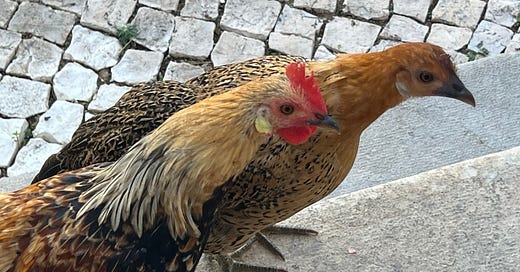



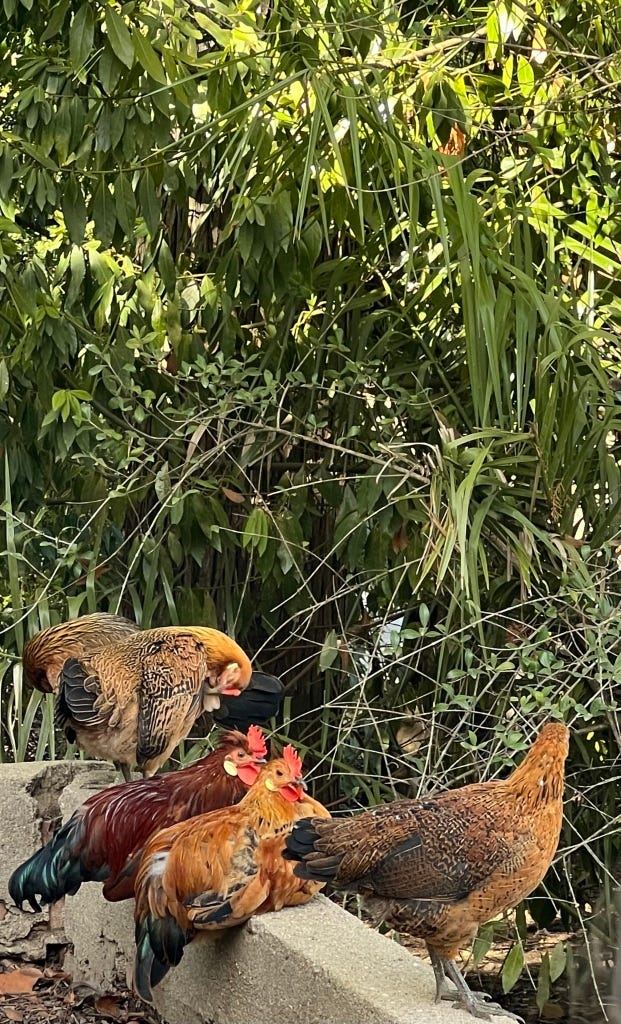
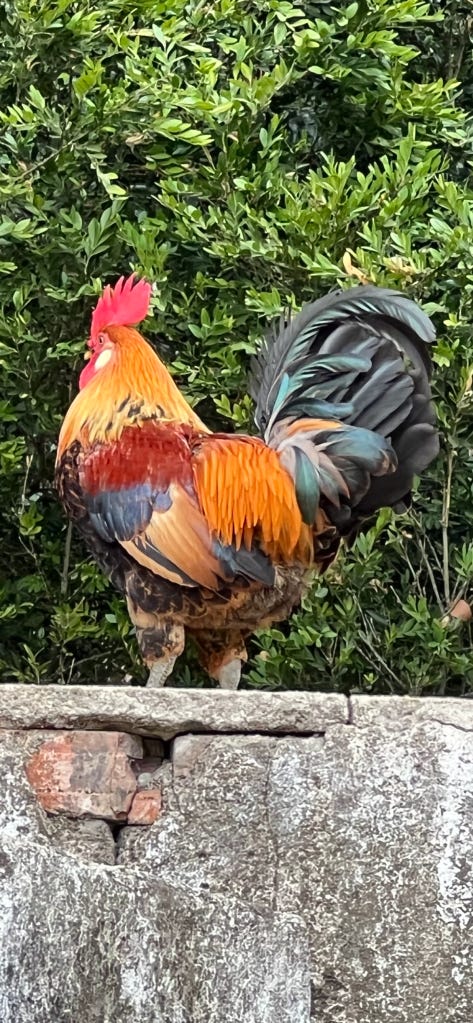
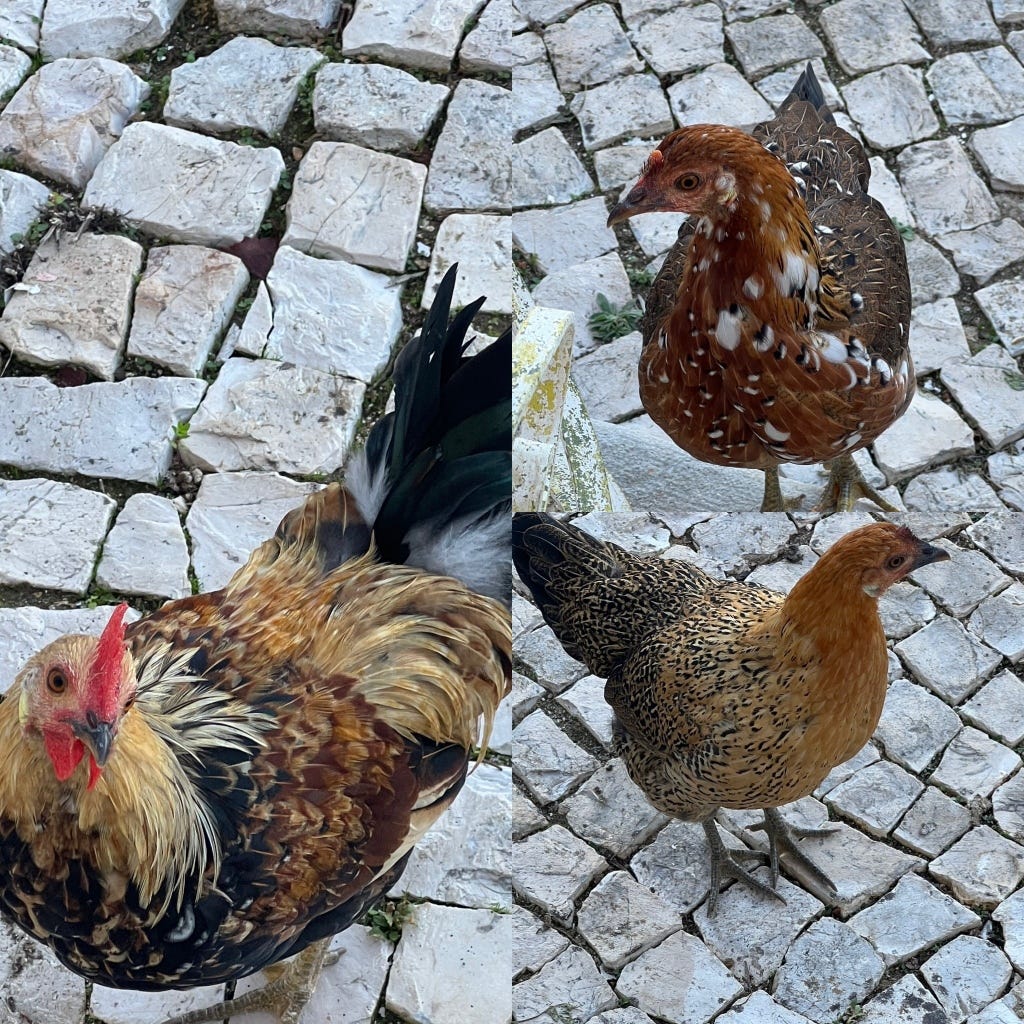
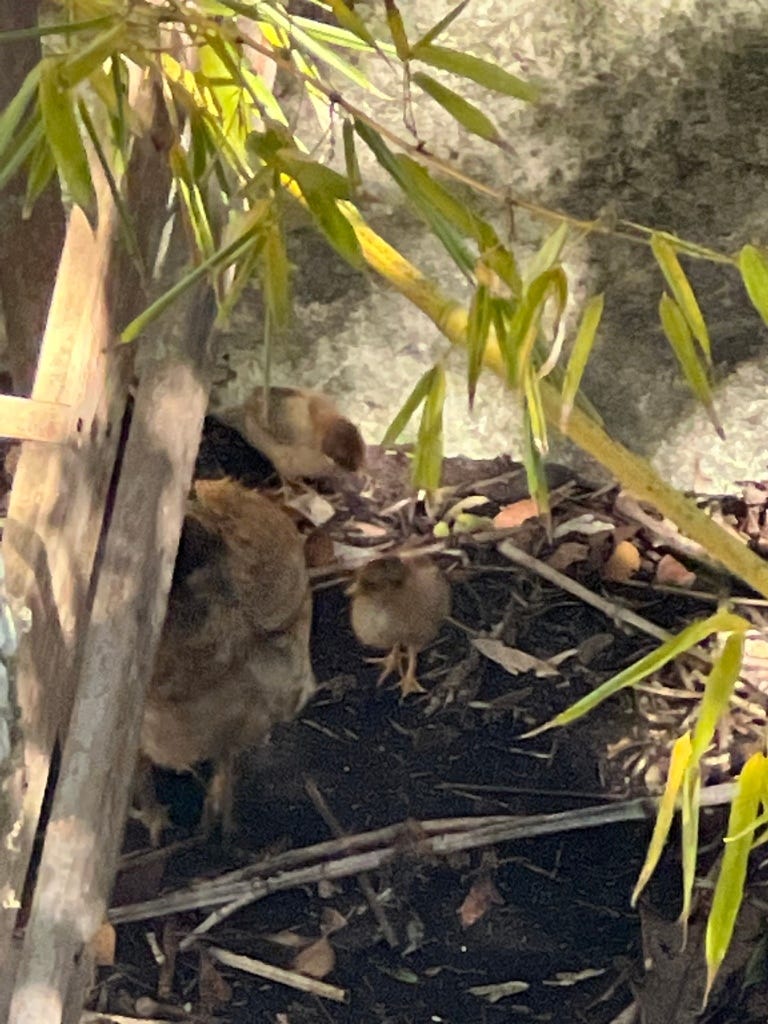
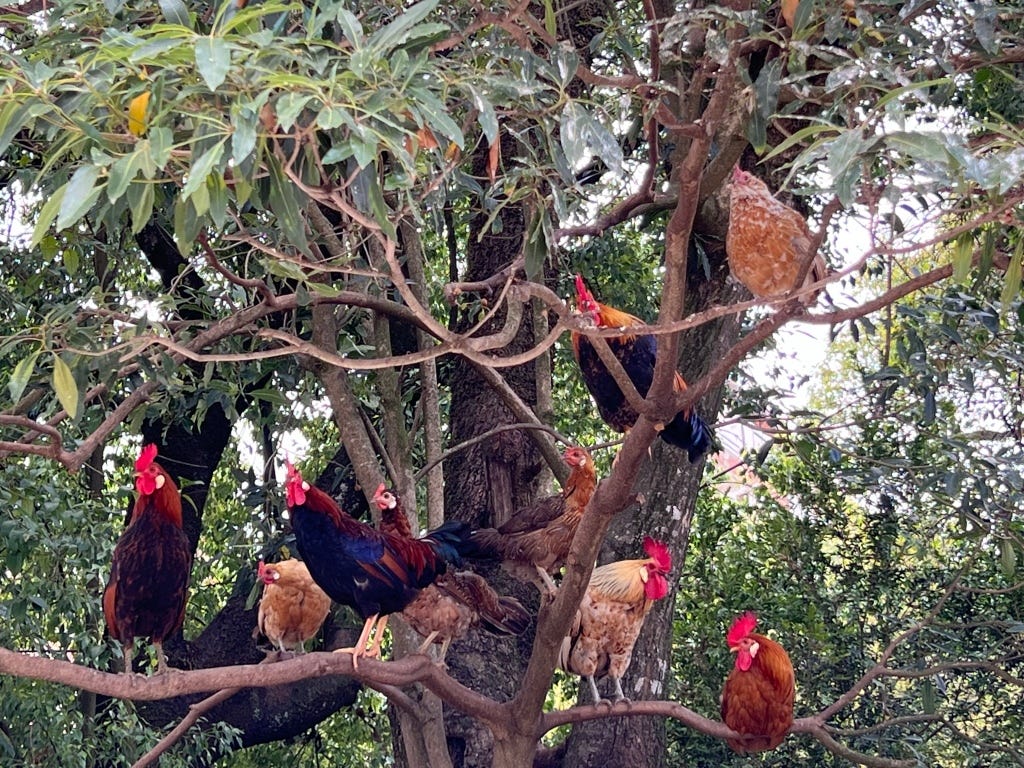
I feel like a person who has struck literary gold with this post. Truly wonderful!!!🐰